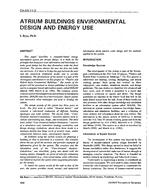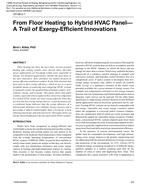Duct loops are often used in VAV air systems to save energy, ensure a balanced air delivery, and simplify fabrication and construction. Duct loop performance is more complicated than that for a standard radial tree network, and simulation methods are required. Such simulation is examined. Part-load and asymmetric duct loops are also analyzed where numerical methods are required rather than dividing the symmetrical duct in two for easy calculation. The numerical method is discussed. The full and part-load simulation of duct loops and comparable networks are then considered. Significant savings in fan power are possible compared to radial tree and two-branched networks, but the non-duct pressure losses (coils, filters, etc.) will determine the actual system saving in each case. However, duct loops do require a larger amount of sheet metal in most cases for which the costs will count against the duct loops. However, economics are not considered in any depth in this paper.
Units: Dual
Citation: Symposium, ASHRAE Transactions, vol. 111, pt. 1, Orlando 2005
Product Details
- Published:
- 2005
- Number of Pages:
- 8
- File Size:
- 1 file , 830 KB
- Product Code(s):
- D-25531


